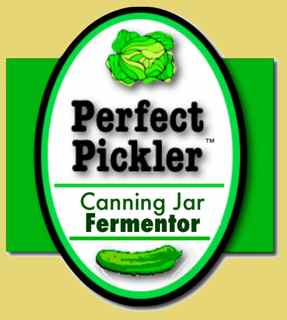Fermentable Healthcare Issue

Brine Pickling U. Newsletter
The Science of Homemade: Probiotic Farming
With a brine pickling fermentor—like the Perfect Pickler, or a pickling crock— you become a farmer in every sense of the word. You tend and raise a livestock—lactic-acid bacteria—in the trillions. You convert common vegetables into raw, cultured, farmed-in-your-kitchen foods. I dub thee a “farmacist.” There is science within these ferment gardens. Follow us in our continuing Pickling U. Newsletter. We promise to enlighten. - Bill Hettig
This Issue of Brine Pickling U.
Fermentable Healthcare • Anticancer Pickles? • Probiotics Farming • Taming Fiery Onions • Quick Probiotic Pickles
Fermentable Health? The Power of Fermentation on Human Health
Noted medical doctor, Daphne Miller, writes, “...fermented [food] is probably one of the greatest losses [to the American diet].... Most people have nothing that’s truly fermented in their diet. Even the pickles and sauerkraut and things that you can buy in some supermarkets across America aren’t made through a true fermentation process anymore. So they lack all the health benefits. But recently the medical literature has been showing that genetic information is actually put into our gut through eating fermented foods. It’s becoming really obvious that this plays a key role in everything from food allergies to possible cancer prevention.” - Daphne Miller, MD, Gourmet, 5/6/08
Dr. Miller wrote a definitively researched and highly readible book, The Jungle Effect, extensively studying the societies around the globe that have very low incidences of Western diseases. She noted that each group prepared and served fermented foods as an integral part of their traditional diet. Each group independently found the sublime power these functional foods have in digesting their meals and boosting their immune systems.
Anticancer Pickles? Medicine Never Tasted So Good
Scientists at the University of Illinois have shown for the first time that sulforaphane—the powerful cancer-fighting agent in broccoli—can be released from its parent compound by bacteria in the lower gut and absorbed into the body.
The researchers suggested a couple of ways to provide this benefit, but I have a far simpler and direct idea. See it in option 3.
• 1 "One way might be to feed the desirable bacteria with prebiotics like fiber to encourage their proliferation.”
• 2 "Another way would be to use a probiotic approach -- combining, say, broccoli with a yogurt sauce that contains the hydrolyzing bacteria, and in that way boosting your cancer protection."
• 3 One of the best ways is to culture broccoli and then eat it as a pickle. The very same bacteria that reside in our gut live naturally on the broccoli in the fields. Build the recipe in a brine fermentor and "they will come" beneficial bacteria in the trillions. These bacteria can break out the sulforaphane during fermentation. Now you can eat a tasty pickle and consume a special, functional food—at the cost of pennies. For extra nutritive thrust, I add alliums (onion family) as an ingredient. They, too, are found to exhibit anticancer activity as researched by David Servan-Schreiber, M.D. in his seminal book, Anticancer.
Here’s a quick way to power up broccoli— just a few minutes of prep time.
Pickled Broccoli Slaw
As a timesaver buy the ready packs of broccoli slaw. They include julienne slivers of broccoli stalk, carrots, etc. Use one pound per quart jar. Include a handful of sliced or chopped onion of choice, and a couple cloves of sliced, raw garlic. Pick a spice blend from a favorite part of the world: five-spice, garam masala, jerk—add a tsp. or two per quart. Make up a brine and load and lock the Perfect Pickler. In about 4 days, you have a powered-up pickled broccoli, both tasty and at-the-ready to join your gut microbiota.
Broccoli in it’s raw state gets a little too overpowering to eat regularly. But, when pickled, and made with fine strips of peeled stalk and flavored with spices and herbs—”it’s a whole other vegetable.“
With homemade brine pickles you can not seek a more reasonably priced functional food anywhere on the planet. Brine pickling makes cents!
When Vegetables Bite Back: Defanging Onions & Radishes
I am a longtime sufferer of raw onion bite, you know that oniony reminder that hangs on long after the meal. Arrgghh! To the rescue—here are two techniques to defang your pickling veggies.
To tame onions, add 2 TBS. unpasteurized apple cider vinegar to a quart of water. Drop the onions in for five minutes then drain, but do not rinse. Discard vinegar-water.
An alternative method tested by America’s Test Kitchen: dissolve 1 TBS. baking soda in one cup of water and soak the sliced onions for 15 minutes, then rinse well.
For radishes with a fiery bite—taste to know—I used the second method listed above and eliminated some of the unwanted heat.
Onions, garlic, and other alliums will mellow naturally when brine fermented. But when they equal the majority of ingredients in a recipe, be sure to use one of the methods listed to tame any of the fiery players.
